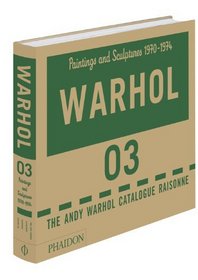Search -
Andy Warhol Catalogue Raisonn?, Volume 3: Paintings and Sculptures 1970-1974
Andy Warhol Catalogue Raisonn Volume 3 Paintings and Sculptures 19701974
Author:
"This third volume of the catalogue dedicated to publishing the complete paintings, sculptures and drawings of Andy Warhol (1928-87) focuses on the years 1970 to 1974. With the authoritative writing and fascinating attention to detail of the first two volumes, Warhol's works of these four years are comprehensively catalogued and illustrated, wit... more »
Author:
"This third volume of the catalogue dedicated to publishing the complete paintings, sculptures and drawings of Andy Warhol (1928-87) focuses on the years 1970 to 1974. With the authoritative writing and fascinating attention to detail of the first two volumes, Warhol's works of these four years are comprehensively catalogued and illustrated, wit... more »
ISBN-13: 9780714856988
ISBN-10: 0714856983
Publication Date: 6/9/2010
Pages: 544
Rating: ?
ISBN-10: 0714856983
Publication Date: 6/9/2010
Pages: 544
Rating: ?
0 stars, based on 0 rating
Genres:
- Arts & Photography >> History & Criticism >> General
- Arts & Photography >> Individual Artists >> ( V-Z ) >> Warhol, Andy
- Arts & Photography >> Art >> Painting >> General
- Arts & Photography >> Art >> Sculpture >> General




